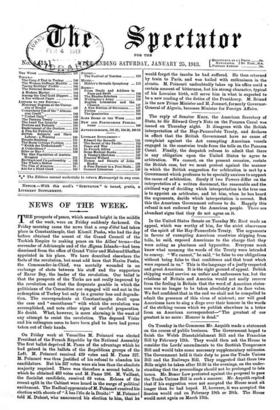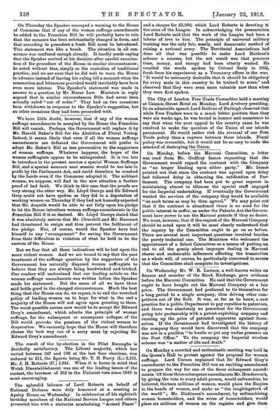On Tuesday in the Commons Mr. Asquith made a statement
on the course of public business. The Government hoped to finish the Welsh Disestablishment Bill and the Franchise Bill by February 12th. They would then ask the House to consider the Lords' amendments to the Scottish Temperance Bill and would take some necessary supplementary estimates. The Government held it their duty to pass the Trade Unions Bill and the Railways Bill. They suggested that these two Bills might be taken after 10.30 in the evenings, on the under- standing that the proceedings should not be prolonged to late hours. Mr. Sonar Law protested against the proposal to pass the Trade Unions Bill in such a manner. Mr. Asquith replied that if his suggestion were not accepted the House must sit longer than he had hoped. If, however, it was accepted the Session would end on February 19th or 20th. The House would meet again on March 13th.
On Thursday the Speaker conveyed a warning to the House of Commons that if any of the woman suffrage amendments be added to the Franchise Bill he will probably have to rule that the measure has been substantially changed in form, and that according to precedent a fresh Bill must be introduced. This statement was like a bomb. The situation in all con- science was confused enough already. It hardly needs saying that the Speaker arrived at his decision after careful examina- tion of the procedure of the House in similar circumstances ; he acted without bias, simply as the custodian of traditional practice, and we are sure that he did well to warn the House in advance instead of leaving his ruling till a moment when the commotion and bitterness provoked would inevitably have been even more intense. The Speaker's statement was made in answer to a question by Mr. Bonar Law. Ministers in reply argued that in similar circumstances Bills had never been actually ruled " out of order." They had on two occasions been withdrawn in response to the Speaker's suggestion, but on other occasions they had been proceeded with.



























































 Previous page
Previous page